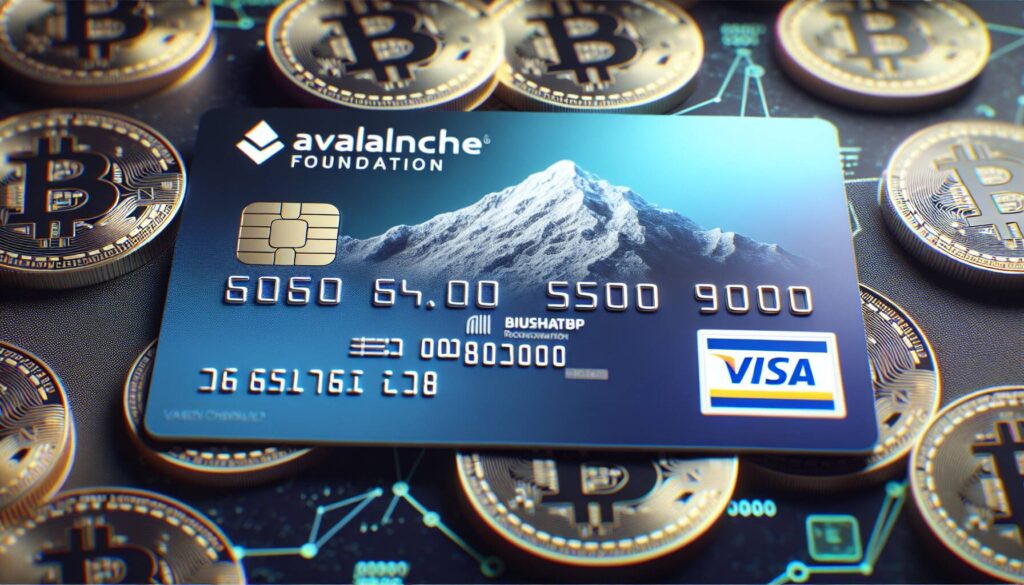The Avalanche Foundation has recently launched the much-anticipated Avalanche Card, marking a significant milestone in the integration of cryptocurrency with everyday financial transactions. This Visa credit card allows users to spend their digital assets, including Avalanche tokens (AVAX), wrapped AVAX, and stablecoins like USDT and USDC, at any merchant that accepts Visa. In an age where digital currencies are becoming more mainstream, the Avalanche Card stands out as a convenient tool for both in-person and online shopping.
Developed in collaboration with Rain, a blockchain-based card issuing platform, this card enables seamless transactions that bridge the gap between traditional finance and the burgeoning world of cryptocurrency. As noted in a recent statement from the Avalanche Foundation, the card has seen increased interest and sign-ups particularly in regions such as Latin America, the Caribbean, Southeast Asia, and Africa—areas known for their growing interest in blockchain technology and decentralized finance (DeFi).
“In a move to double down on mainstream adoption of decentralized finance (DeFi), Avalanche remains committed to powering accessible inroads to blockchain for every type of user,” the foundation stated.
The Avalanche Card is also designed to provide users with a new self-custody wallet and a unique address for each asset, enhancing security and control over their cryptocurrency holdings. With multiple teams across the cryptocurrency landscape releasing similar credit card solutions, the Avalanche Card reflects the broader trend of increasing collaboration between conventional financial systems and innovative digital currencies.

Avalanche Foundation Launches Visa Credit Card for Cryptocurrency Users
The Avalanche Foundation has announced the launch of the Avalanche Card, a Visa credit card designed to facilitate the use of cryptocurrencies in everyday transactions. Below are the key points related to this development:
- Collaborative Development: The Avalanche Card was developed in partnership with Rain, a blockchain-based card issuing platform.
- Cryptocurrency Transactions: Users can spend Avalanche tokens (AVAX), wrapped AVAX, and stablecoins USDT and USDC at any Visa-accepting store, both online and in-person.
- Increased Mainstream Adoption: This card represents a significant step toward integrating traditional financial systems with cryptocurrency, highlighting the growing acceptance of digital currencies.
- Focus on Emerging Markets: The Avalanche Foundation aims to attract users primarily from Latin America and the Caribbean, with sign-ups accelerating in these regions as well as Southeast Asia and Africa.
- Self-Custody Wallet: The card is linked to a new self-custody wallet, providing users a unique address for each asset they hold.
- Commitment to DeFi Accessibility: Avalanche emphasizes its dedication to making decentralized finance (DeFi) more accessible to a diverse range of users.
“In a move to double down on mainstream adoption of decentralized finance (DeFi), Avalanche remains committed to powering accessible inroads to blockchain for every type of user.”
These developments may impact readers by providing more flexible options for using cryptocurrencies in everyday purchases, fostering broader acceptance of digital currencies, and connecting with evolving financial technologies. By leveraging such tools, users can engage more seamlessly with both cryptocurrency and traditional financial systems.
Avalanche Card: A Step Towards Mainstream Crypto Spending
The launch of the Avalanche Card marks a significant milestone in the ongoing quest to bridge traditional financial services and the world of cryptocurrency. Developed by the Avalanche Foundation in partnership with Rain, this Visa credit card offers cryptocurrency enthusiasts a seamless way to use their digital assets for everyday purchases. Notably, users can leverage their Avalanche tokens (AVAX), wrapped AVAX, as well as stablecoins like USDT and USDC at any merchant that accepts Visa. This versatility sets the Avalanche Card apart in a rapidly evolving market where options for crypto-backed spending are becoming increasingly common.
Competitive Advantages: One of the Avalanche Card’s most appealing features is its emphasis on accessibility, particularly in emerging markets like Latin America, the Caribbean, Southeast Asia, and Africa. By targeting these regions, where traditional banking services may be lacking or difficult to access, the Avalanche Foundation is positioning itself as a vanguard of financial inclusion. Moreover, the self-custody wallet associated with the card offers added security and user autonomy, a crucial element for crypto users concerned about privacy and control over their funds.
Challenges and Disadvantages: However, this rollout does not come without challenges. The crypto credit card landscape is becoming increasingly saturated, with competitors such as Binance and Crypto.com already catering to users seeking to combine crypto assets with traditional spending methods. This means that while the Avalanche Card has distinct features, it may struggle to gain widespread adoption in a competitive marketplace. Additionally, the volatility of cryptocurrency values could raise concerns among potential users who may hesitate to use their crypto as a payment method, fearing rapid fluctuations in asset value.
Ultimately, the Avalanche Card’s success may hinge on its ability to resonate with tech-savvy consumers eager for innovative financial solutions while simultaneously addressing the insecurities tied to cryptocurrency usage. The card’s benefits could attract a demographic of younger consumers and crypto enthusiasts keen on exploring the intersection of DeFi and daily spending. However, those unfamiliar with cryptocurrencies or wary of their risks may find the adoption process challenging, potentially leaving them out of the evolving financial landscape.















